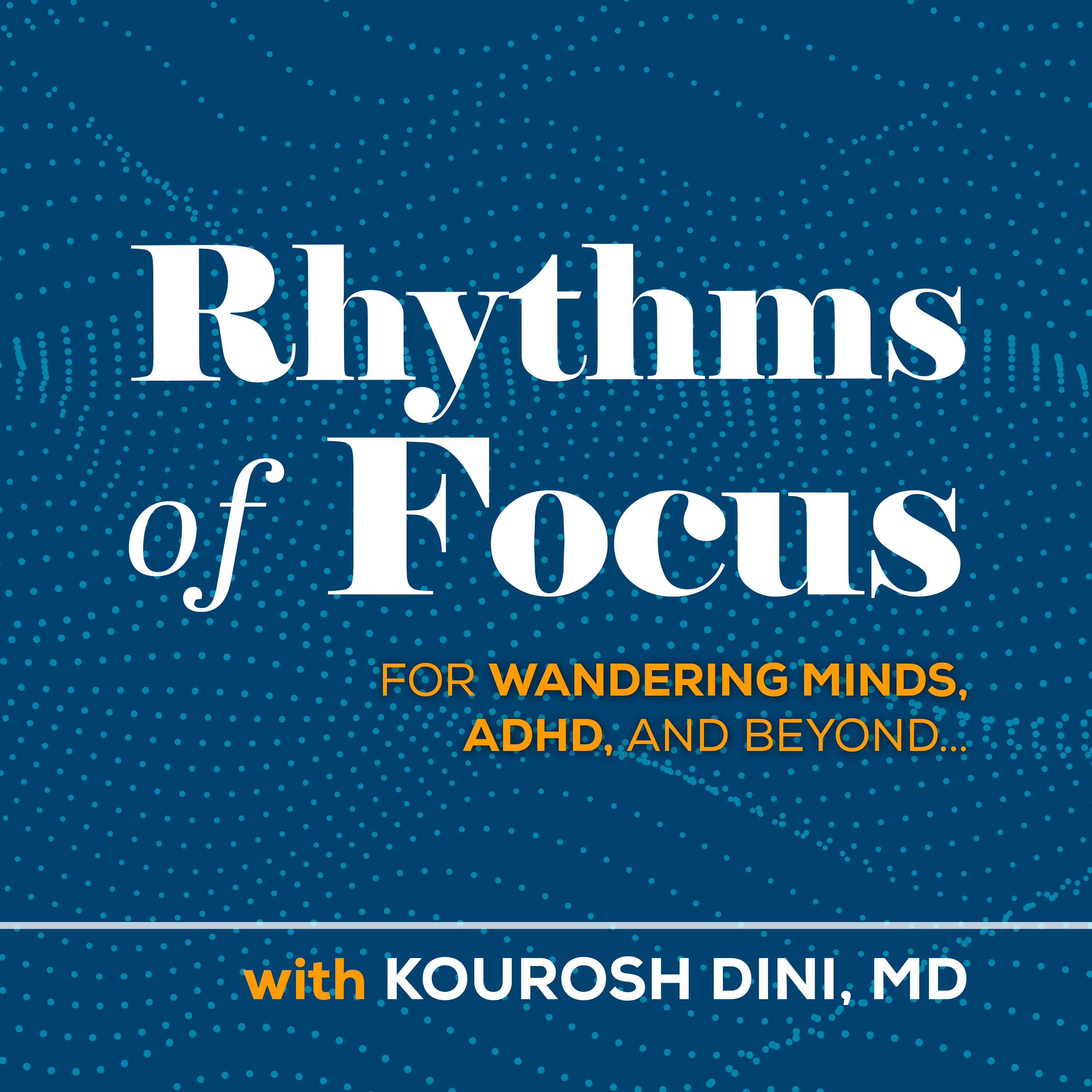Episode 2
2. Work, Play, and the Wandering Mind
Summary
In this episode of "Rhythms of Focus," we explore the intricate relationship between work, play, and the wandering mind. We consider how an overabundance of creativity can lead to focus challenges, and consider a fresh perspective on productivity that embraces playfulness.
Key takeaways
1. The struggles of a wandering mind often stem from an overabundance of creativity.
2. Mastery and meaningful work develop from guided play.
3. Success is a continuously shifting flow of question, movement, discovery, and curiosity.
Dr. Dini challenges the cultural divide between work and play, encouraging listeners to find strength in their union. He emphasizes the importance of organizing and developing processes that honor individual creativity and work styles. The episode concludes with a musical piece composed by Dr. Dini, illustrating the ephemeral nature of creative work.
Time Stamps
00:00 Work, Play, and the Wandering Mind
02:24 The Seriousness of Play
03:43 Guiding Play Into Meaningful Work
04:18 The Cultural Divide Between Work and Play
04:51 A Seinfeld Lesson: The Cost of Disconnected Work
06:50 Flow as Success: A New Definition of Work
07:46 The Individual Spirit: Organizing Without Stifling Creativity
09:34 One Approach in Guiding Play Into Mastery
Keywords
#ADHDCreativity #GuidedPlay #MeaningfulWork #ProductivityMindset #WorkPlayBalance #WanderingMind #CreativeFlow #MasteryJourney #FocusChallenges #NeurodivergentThinking
Transcript
Sometimes work is simply a drudgery.
There's no getting around it. But I do wonder how often that sense might also come from how we're defining work. Maybe more to the point how we define our success in doing it. Maybe we use these external benchmarks of achieving some score or some milestone and the like.
And certainly these can be important, vital, even. But I also wonder, could we be leaving out something even more vital, something that connects to us. Could we instead look at it this way? That success instead is a continuously shifting flow where that nameless wordless spirit of question and movement, discovery and curiosity offers something to the world, which then that world in turn supports us in our paths of maturing that spirit.
I like that definition of work.
The Seriousness of Play
I want to start by sharing a quote.
"Man is most nearly himself when he achieves the seriousness of a child at play." Hericlitus, 535 to 475 bc. Now, I don't know anything about this guy, but I really do like that quote.
Now, how does this relate to a wandering mind, like ADHD, among others?
One view I like to take is that the struggles of a wandering mind can come from an overabundance of creativity.
Right? That spirit of creativity. And the soul of it itself is play, is it not? It's where creativity flows within and through.
It's when that flow becomes over abundant that we can struggle with how we relate to the worlds that we're in. One moment we can be deeply engaged, thrilled to be there, and other moments were overwhelmed, jumping from one thing to the next, never fully catching anything, forgetting, losing things, trying to figure out what the next deadline is.
The boundaries can just somehow become too porous to hold on to anything. It's hard. And then we crash, exhausted, unable to engage much at all, let alone deal with those things that feel that might be important, but somehow continue to elude our attention.
Guiding Play Into Meaningful Work
We can't really tell play what to do. Meanwhile, it's a powerful force. So the importance of figuring out ways to guide it within us, I think is there. I like to think of things in this almost positive way however-- that there's this playful, creative force that we're trying to deal with, that we need to guide. Because then it becomes more about practicing for a goal rather than trying to run away from something else.
I've said before, and I'll say it again:
"Mastery and meaningful work developed from guided play and care."
The Cultural Divide Between Work and Play
Too often, I think because of the troubles we get into with that overabundance of creativity, we end up seeing that spirit of play to be at odds with work. And our culture supports that sense too. We raise our geniuses and champions on our shoulders and say, "Hey, aren't they amazing in how they work" without ever truly acknowledging relishing, thinking about that practice of harnessing and even delighting in play --the things that they did early on in the way to get to where they are.
A Seinfeld Lesson: The Cost of Disconnected Work
Let me play this clip here from the show Seinfeld that I think describes this problem.
George Costanza, this character pretends to work by being annoyed. He scrunches his face, he grunts even though he has nothing about which to complain. Meanwhile, others think he's working hard and leaving him alone.
His workers look at him in awe of his work ethic and he does nothing of use, and it's funny, but there's always that grain of truth within the joke.
His work is disconnected from that playful sense of self, having spent it in creating a mask to hide himself. He shows the world what he thinks it wants to see in exchange for money and maybe a few empty looks of admiration from his peers.
The cost is major. He lives in this hollow state. He puts on a mask, which functions like any wall. He's trapped within it, unengaged in developing something that feels meaningful.
Now for a wandering mind, again, there can be that overabundance of that creative spirit, and consequently, there's a struggle to guide it certainly. And we still need to do the things that are meaningful to us and don't spark that play in the moment, clearly.
But for today's topic, at least, I wanna stay with this argument that I think we lose something when we paint work to be something in opposition to that playful self, rather than finding the strength in their union.
Flow as Success: A New Definition of Work
You know, what if we looked at it that way? That success instead is a continuously shifting flow where that nameless, wordless spirit of question and movement, discovery and curiosity offers something to the world, which then that world in turn supports us in our paths of maturing that spirit.
I like that definition of work.
Masters of a field regularly will take time and attention in some path of practice, study creation, organizing. Whenever we see that master at their craft, that quiet smile that shows up in the middle of otherwise massive feats shows a clear beauty of that playful spirit flowing through the work. If there's a commonality to those who achieve productivity, mastery, development in their life and work, this ability has to be in there somewhere.
The Individual Spirit: Organizing Without Stifling Creativity
Now, there's something crucial to that play that I haven't said here, and namely that it's profoundly unique to the individual. Concepts of work and organizing are often filled with the sense that they would stifle play rather than enhance it.
And many look at habit and routine and careful arrangements of the environment organizing by this, that, or the other, and they worry that these things, these ways that other people work on their paths could destroy that sense within themselves.
And they believe it's not gonna work for them. And I think they're right.
Organizing, developing, processing, practicing, movement, all of these need to take the individual spirit into account-- that unique relationship between self and world.
That's not to say that we don't study, we don't learn, but we take and we adapt to that central spirit that we have within ourselves, that nameless, wordless place, and that's the work of guiding play into mastery and meaningful work.
So next time you're engaged in that place of flow, exploring self and world, realize consciously how you're organizing to have it directly work with you.
Whether you're trying to make things easier to get to, trying to get things out of your way, it means you don't need to use somebody else's color coordination scheme or alphabetizing methods or whatever.
You can study it, you can look at it, but somewhere you need to make it your own. It has to connect and support you with where you are.
One Approach in Guiding Play Into Mastery
Personally, I have a way of creating music that's probably quite unique to me, organized over time and decades at this point, how I record and do things. For today's piece of music, I'll probably never play it again. Many of the pieces I write exist only briefly. It's part of the process that I play them for a few turns, learn 'em, build on them, and then let 'em drift away.
They kind of become fertilizer for another piece somewhere down the line that might eventually have greater staying power, maybe not. This is called "Sun Sets On Snow". "Sun" and "Sets" are two separate words. Sun Sets On Snow seems to be one of these pieces that are rather ephemeral, but I enjoy it for the moments that it's here.
Mentioned in this episode:
Rhythms of Focus - CTA - Subscribe, Rate, and Review
Transcript
S01E02 - Work, Play, and the Wandering Mind
===
[: [: [: [: [: [:---
[: [: [: [: [: [: [:---
[: [: [: [:---
[: [:---
[: [: [: [: [: [: [: [:---
[: [: [: [:---
[: [: [: [: [: [: [: [:---
[: [:

